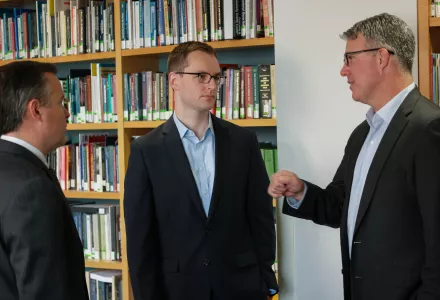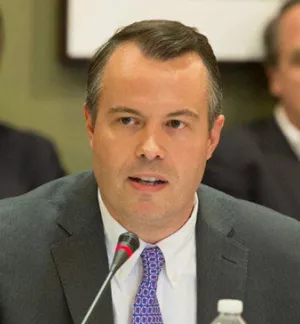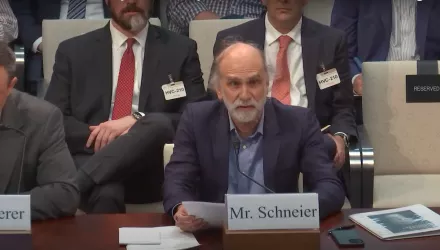
In July, the Belfer Center launched a new, bipartisan initiative called the Defending Digital Democracy Project (D3P). Led by Belfer Center Co-Director Eric Rosenbach, along with the former campaign managers for Hillary Clinton and Mitt Romney, the project aims to identify and recommend strategies, tools, and technology to protect democratic processes and systems from cyber and information attacks.
By creating a unique and bipartisan team comprised of top-notch political operatives and leaders in the cyber and national security world, and working with experts from technology communities, including Facebook and Google, D3P is working to offer concrete solutions to an urgent problem.
Rosenbach, who was Chief of Staff to Secretary of Defense Ash Carter from 2015-2017, served as the Pentagon’s “cyber czar.”
For the D3P project, Rosenbach recruited Robby Mook, Hillary Clinton’s 2016 campaign manager, and Matt Rhoades, Mitt Romney’s 2012 campaign manager, as Senior Fellows and co-leaders of the initiative.
“Americans across the political spectrum agree that political contests should be decided by the power of ideas, not the skill of foreign hackers,” Rosenbach said. “Cyber deterrence starts with strong cyber defense—and this project brings together key partners in politics, national security, and technology to generate innovative ideas to safeguard our key democratic institutions.”
“Over the last two years, nearly every election on both sides of the Atlantic has been affected by foreign cyber attacks, including Hillary Clinton’s in 2016,” said Mook. “Cyber attacks on campaigns and elections,” Rhoades added, “are a threat to our democracy and affect people of all political stripes.”
The Defending Digital Democracy Project is co-sponsored by two other Harvard Kennedy School entities—the Institute of Politics and the Shorenstein Center on Media, Politics, and Public Policy.
The Defending Digital Democracy team also includes Heather Adkins, Director of Information Security and Privacy for Google; Stuart Holliday, President and CEO of Meridian International Center and former U.S. Ambassador for Special Political Affairs at the United Nations; Nicco Mele, Director of the Kennedy School’s Shorenstein Center; Suzanne E. Spaulding, former Under Secretary of the National Protection and Programs Directorate (NPPD) at the Department of Homeland Security; and Alex Stamos, Chief Security Officer for Facebook.
The Defending Digital Democracy Project will help campaign and election officials fortify themselves against attacks by:
- Developing solutions to share important threat information with technology providers, governments, and political organizations;
- Providing election administrators, election infrastructure providers, and campaign organizations with practical “playbooks” to improve their cybersecurity;
- Developing strategies for how the United States and other democracies can credibly deter hostile actors from engaging in cyber and information operations;
- Assessing emerging technologies, such as blockchain, that may improve the integrity of systems and processes vital to elections and democracy;
- Convening civic, technology, and media leaders to develop best practices that can shield our public discourse from adversarial information operations.
For more about the Defending Digital Democracy (D3P) Project, see here.
"Defending Digital Democracy Project Aims to Protect Election Integrity." Belfer Center Newsletter, Belfer Center for Science and International Affairs, Harvard Kennedy School, Fall/Winter 2017-2018.








